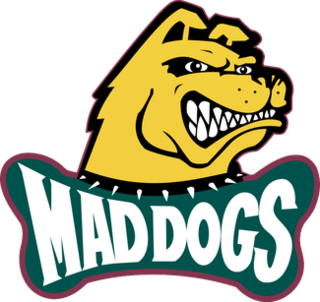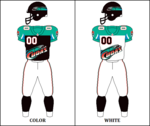
The World Football League (WFL) was an American football league that played one full season in 1974 and most of its second in 1975. Although the league's proclaimed ambition was to bring American football onto a worldwide stage, the farthest the WFL reached was placing a team – the Hawaiians – in Honolulu, Hawaii. The league folded midway through its second season, in 1975. A new minor football league began play as the World Football League in 2008 after acquiring the rights to its trademarks and intellectual property; it folded in 2011.

The Baltimore Stallions were a Canadian Football League team based in Baltimore, Maryland, in the United States, which played the 1994 and 1995 seasons. They were the most successful American team in the CFL's southern expansion into the United States, and by at least one account, the most winning expansion team in North American professional sports history at the time. They had winning records in each season, and in both years advanced to the championship game. In 1995, they became the only American franchise to win the Grey Cup.

The Las Vegas Posse were a Canadian Football League (CFL) team, that played at the Sam Boyd Silver Bowl in Las Vegas, Nevada, United States, in the league's 1994 season as part of the CFL's failed American expansion. Lasting only one season, the Posse were one of the least successful teams in CFL history, both on the field and off.

The Memphis Mad Dogs were a Canadian football team that played the 1995 season in the Canadian Football League. The Mad Dogs were part of a failed attempt to expand the CFL into the United States. They played at Liberty Bowl Memorial Stadium.

The San Antonio Texans were a Canadian Football League (CFL) team that played in the Alamodome in San Antonio, Texas, in the 1995 CFL season. They had relocated from Sacramento, California, where the team had been called the Sacramento Gold Miners. After relocating, the team still had the same ownership in Fred Anderson and the same staff, including President Tom Bass and Head Coach/General Manager Kay Stephenson. The Gold Miners/Texans franchise played three seasons before folding in 1995. They were the southernmost team in CFL history and the only team in CFL history to have ever officially relocated from another market.

The Sacramento Gold Miners were a Canadian football team based in Sacramento, California. The franchise was the first American team in the Canadian Football League. The Gold Miners inherited a home stadium, front office staff and much of the roster of the Sacramento Surge from the defunct World League of American Football. The team played its home games at Hornet Stadium.

The Shreveport Pirates were a Canadian Football League team, playing at Independence Stadium in Shreveport, Louisiana, United States, in 1994 and 1995. Despite a relatively strong fan base, they were one of the least successful of the CFL's American franchises on and off the field.

The Montreal Machine were the sole Canadian team in the World League of American Football (WLAF), a springtime developmental professional league set up by the National Football League (NFL) that played in 1991 and 1992. There were also three European teams and six United States–based teams. Like all WLAF teams, the Machine played American rules football, 11 players per side on a 100-yard-long/53+1⁄3-yard-wide field, rather than Canadian rules football of 12 players per side on a 110-yard-long/65-yard-wide field.

John Perry Pardee was an American professional football player and head coach. He played as a linebacker in the National Football League (NFL). As a coach, he is the only head coach to helm a team in college football, the NFL, the United States Football League (USFL), the World Football League (WFL), and the Canadian Football League (CFL). Pardee was inducted into the College Football Hall of Fame as a player in 1986.
The East Division is one of the two regional divisions of the Canadian Football League, its counterpart being the West Division. Although the CFL was not founded until 1958, the East Division and its clubs are descended from earlier leagues.
The 1996 CFL season is considered to be the 43rd season in modern-day Canadian football, although it is officially the 39th Canadian Football League season.
The 1995 CFL season was the 38th season of the Canadian Football League, and the 42nd in modern-day Canadian football.
The 1994 CFL season is considered to be the 41st season in modern-day Canadian football, although it is officially the 37th Canadian Football League season.

Matt Dunigan is an American broadcaster and former professional football player and executive. He is a Canadian Football League (CFL) sportscaster for Canadian sports television channel TSN. Dunigan is a former quarterback, coach, and executive in the CFL. In 2006, Dunigan joined the Canadian Football Hall of Fame, and was voted one of the CFL's Top 50 players (#39) of the league's modern era by Canadian sports network TSN.
Bernard "Bernie" Glieberman (1939-2024) was an American real estate mogul and the president of Crosswinds Communities. Despite having made his fortune in real estate, Glieberman was perhaps best known for, with his son Lonie, making several unsuccessful and controversial forays into sports team ownership and management in the Canadian Football League.
Arthur L. "Art" Williams Jr. is an American insurance executive living in Palm Beach, Florida. He is the founder of A.L. Williams & Associates, known as Primerica Financial Services since 1991. He also ventured into professional sports, owning the Birmingham Barracudas of the Canadian Football League (CFL) and the Tampa Bay Lightning of the National Hockey League (NHL) for brief periods.

The 83rd Grey Cup a.k.a. The Wind Bowl was the 1995 Canadian Football League championship game played between the Baltimore Stallions and the Calgary Stampeders at Taylor Field in Regina, Saskatchewan. The Stallions won the game by a score of 37–20. It marked the only time that an American-based team won the Grey Cup.
The Canadian Football League (CFL), which features teams based in Canada, has made efforts to gain further audience in the United States, most directly through expansion into the country from the 1993 CFL season through the 1995 CFL season. The CFL plays Canadian football, a form of gridiron football which is somewhat different from the more common American football played in the United States and other parts of the world.

The 1994 Shreveport Pirates season was the first season in the teams franchise history. They finished last place in the East division with a 3–15 record and failed to make the playoffs.
This list combines the statistics and records of the seven CFL American teams from 1993 to 1995: Baltimore Stallions, Birmingham Barracudas, Las Vegas Posse, Memphis Mad Dogs, Sacramento Gold Miners, San Antonio Texans, and the Shreveport Pirates. Though no city lasted more than 2 years in the CFL, they combined for 10 seasons of team statistics, including several record breaking performances.













